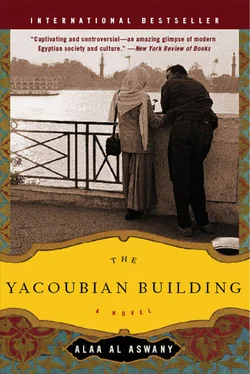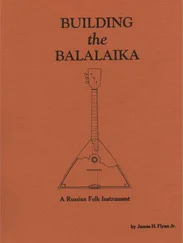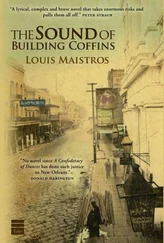Alaa Al Aswany - The Yacoubian Building
Здесь есть возможность читать онлайн «Alaa Al Aswany - The Yacoubian Building» весь текст электронной книги совершенно бесплатно (целиком полную версию без сокращений). В некоторых случаях можно слушать аудио, скачать через торрент в формате fb2 и присутствует краткое содержание. Год выпуска: 2006, ISBN: 2006, Издательство: Adobe Acrobat eBook Reader, Жанр: Современная проза, на английском языке. Описание произведения, (предисловие) а так же отзывы посетителей доступны на портале библиотеки ЛибКат.
- Название:The Yacoubian Building
- Автор:
- Издательство:Adobe Acrobat eBook Reader
- Жанр:
- Год:2006
- ISBN:978-0-06-087813-9
- Рейтинг книги:5 / 5. Голосов: 1
-
Избранное:Добавить в избранное
- Отзывы:
-
Ваша оценка:
- 100
- 1
- 2
- 3
- 4
- 5
The Yacoubian Building: краткое содержание, описание и аннотация
Предлагаем к чтению аннотацию, описание, краткое содержание или предисловие (зависит от того, что написал сам автор книги «The Yacoubian Building»). Если вы не нашли необходимую информацию о книге — напишите в комментариях, мы постараемся отыскать её.
The Yacoubian Building — читать онлайн бесплатно полную книгу (весь текст) целиком
Ниже представлен текст книги, разбитый по страницам. Система сохранения места последней прочитанной страницы, позволяет с удобством читать онлайн бесплатно книгу «The Yacoubian Building», без необходимости каждый раз заново искать на чём Вы остановились. Поставьте закладку, и сможете в любой момент перейти на страницу, на которой закончили чтение.
Интервал:
Закладка:
Abduh told his neighbors that he worked as Hatim Rasheed’s cook, but they didn’t believe him because they knew about Hatim’s homosexuality and because he would spend the night with him at least twice a week. Among themselves, they would joke about these “midnight feasts” that Abduh would prepare for his master, knowing the truth and accepting it. In general their behavior with any deviant person depended on how much they liked him. If they disliked him, they would rise up against him in defense of virtue, quarrel bitterly with him, and prevent their children from having anything to do with him. If, on the other hand, they liked him, as they did Abduh, they would forgive him and deal with him on the basis that he was misled and to be pitied, telling one another that everything in the end was fate and that it was not unlikely that God, Almighty and Glorious, would set him on the straight path — and “How many others have been worse than that but Our Lord set them straight and inspired them and they became saints.” They would say this smacking their lips and nodding their heads in sympathy.
Abd Rabbuh’s life proceeded virtually without problems, but his relationship with his wife Hidiya remained tense. She was happy with her cosseted new life, but something deep and sharp continued to smolder between them — it would flare up, then die down and sometimes disappear from sight, but it was always there. When he came to her after a night spent with Hatim, he would be shamefaced and irritable, avoiding her eyes and rounding on her furiously for the least mistake. She would meet his outbursts with a sad smile that provoked him even more, so that he’d scream, “Say something, you dumb cow!”
“God forgive you,” Hidiya would answer him in a soft voice and leave him alone till he had calmed down. When they were together in bed, at a moment of passion, Abduh would often think of his lover Hatim and then feel as though she were reading his thoughts and bury his worries in her body, making love to her extremely violently, as though he were trying to stop her thoughts or assaulting her to punish her for knowing about his homosexuality. When he had finished, he would lie on his back and light a cigarette and stare at the ceiling of the room and she would lie at his side, the sharp thing suspended between them, impossible either to ignore or to acknowledge.
Once Abduh responded to a mysterious inner urging. He was sick of the pretense of ignorance and the oppressive weight of the matter on his heart, and in the depths of his soul he wanted a confrontation with Hidiya instead of this painful equivocation. If she would just burst out in his face and accuse him of being a sodomite, he would be freed of the burden and tell her everything and point out to her quite simply that he couldn’t do without Hatim because he needed the money; so he said to her suddenly, “You know, Hidiya, Hatim Bey is a very kindhearted man… Why don’t you say something?”
“Because he isn’t kindhearted or anything of the sort. It’s just that you’re honest and he depends on your work.”
This was the argument she always used in front of the neighbors, and she spoke sharply because he had violated that pretense of ignorance that allowed her to avoid embarrassment. He repented a bit of his outburst and said to her calmingly, “All the same, wife, he’s to be thanked because he did us all these favors.”
“There are no favors. Everyone does what’s in his best interest. You understand and I understand. God forgive us for Hatim and for Hatim’s job and for every day we’ve spent with him.”
Her words hurt him so he took refuge in silence and turned his face toward the wall, which made her pity him. She moved close to him and took his hand between hers, kissed it, and whispered tenderly, “Abu Wael, may Our Lord preserve you for us and send you our daily bread by honest means. I wish you’d put aside a little money that we could use so you could open your own kiosk and wouldn’t owe anybody anything. Not Hatim or anybody.”

Like some great colonial power, Malak Khilla’s objective is extension and control. An insistent inner force drives him to take possession of whatever is to hand regardless of its value and by any means.
Since arriving on the roof he hasn’t stopped expanding in all directions. It started with a small abandoned latrine that lay to the right of the entrance. As soon as Malak saw it, he started to take it over. He put empty cardboard boxes in front of it, then started storing some of them inside the bathroom, and eventually locked it with a big padlock whose key he put in his pocket with the excuse that the items inside were liable to be stolen if the latrine remained open.
Following the latrine, he took over a large area of the roof that he filled with old, broken tailoring machines, informing the residents (who were naturally upset at this development) that these machines were waiting for someone or other to take them at the first opportunity and fix them. However, this person would always miss his appointment and contact Malak at the last moment by telephone that something or other had cropped up and assure him that he was definitely coming after a week, or two weeks at the most, to take the machines. By this means, Malak kept delaying until he was able to impose a fait accompli . The big bay formed by the wall of the roof, on the other hand, he took at one fell swoop, bringing in three carpenters who in less than an hour had made a wooden door that covered the bay and put a padlock on it whose key he kept. This way he acquired out of thin air an extra cupboard for storing his stock.
During these battles Malak, like a seasoned politico, would absorb the anger and objections of the residents by any means possible, from appeasement, through playing down the issue, all the way if necessary (though this was seldom) to violent fights. He was assisted in this by the fact that, to his good fortune, Mr. Hamid Hawwas had eventually succeeded, after sending complaints to virtually every official in the government, in having his arbitrary transfer to Cairo annulled and had returned to his home in El Mansoura. This relieved Malak of a stubborn foe capable of thwarting his expansionist plans on the roof.
However, the small victories, such as the bathroom and the cupboard, could only satisfy Malak’s lust for real estate in the manner that a victory at chess might satisfy a great military leader. He was dreaming of a major coup that would earn him a huge sum: a nice piece of land, for example, that he could get hold of by force of possession, or a large apartment whose occupant had died that he could take over. This last situation was widespread in Downtown: an aged foreigner would often die single and without family and the closest Egyptian to him — his laundryman or his cook or his maid’s husband — would take over his apartment. This person would rush to take up residence in the apartment and make a report asserting that he was resident there; he would change the locks, send himself registered letters as supporting evidence, and arrange for false witnesses to affirm before the court that he’d been living there all along with the deceased foreigner. Then he would commission a lawyer to followup the long, slow court case against the owner of the building, who usually in the end would be forced to accept a settlement that was much less than the apartment’s real worth.
The hope of some such stroke of luck kept playing with Malak’s dreams as the breeze plays with the branches of the trees. He reviewed the apartments in the Yacoubian Building that might be possessable and found that the one most within his reach was Zaki el Dessouki’s (six rooms plus reception, two bathrooms, and a large balcony looking out onto Suleiman Basha). Zaki was an old single man who might die at any moment, and the apartment was rented and rented property could not be passed on to one’s heirs. Likewise the presence of his brother Abaskharon in the apartment would facilitate Malak’s taking possession of it at the critical moment.
Читать дальшеИнтервал:
Закладка:
Похожие книги на «The Yacoubian Building»
Представляем Вашему вниманию похожие книги на «The Yacoubian Building» списком для выбора. Мы отобрали схожую по названию и смыслу литературу в надежде предоставить читателям больше вариантов отыскать новые, интересные, ещё непрочитанные произведения.
Обсуждение, отзывы о книге «The Yacoubian Building» и просто собственные мнения читателей. Оставьте ваши комментарии, напишите, что Вы думаете о произведении, его смысле или главных героях. Укажите что конкретно понравилось, а что нет, и почему Вы так считаете.












